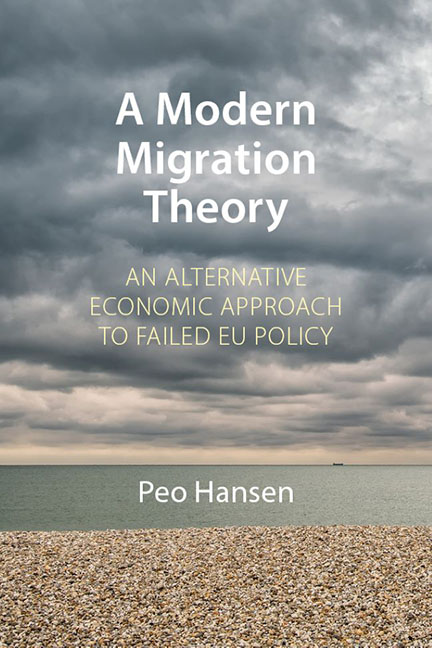Book contents
- Frontmatter
- Dedication
- Contents
- Preface and acknowledgements
- Foreword
- 1 Migration: the “mother of all problems”
- 2 The fiscal impact of migration
- 3 A modern migration theory
- 4 Demography, security and the shifting conjunctures of the European Union’s external labour migration policy
- 5 Labour migration in a sound finance policy logic
- 6 Why EU asylum policy cannot afford to pay demographic dividends
- 7 “We need these people”: refugee spending, fiscal impact and refugees’ real bearing on Sweden’s society and economy
- 8 Conclusion
- Bibliography
- Index
6 - Why EU asylum policy cannot afford to pay demographic dividends
Published online by Cambridge University Press: 20 December 2023
- Frontmatter
- Dedication
- Contents
- Preface and acknowledgements
- Foreword
- 1 Migration: the “mother of all problems”
- 2 The fiscal impact of migration
- 3 A modern migration theory
- 4 Demography, security and the shifting conjunctures of the European Union’s external labour migration policy
- 5 Labour migration in a sound finance policy logic
- 6 Why EU asylum policy cannot afford to pay demographic dividends
- 7 “We need these people”: refugee spending, fiscal impact and refugees’ real bearing on Sweden’s society and economy
- 8 Conclusion
- Bibliography
- Index
Summary
“Fluchtlingshilfe: Unser Land uberrascht sich selbst” – “Help for refugees: our country surprises itself.” So ran the headline on Die Zeit's web edition in the evening of 18 September 2015 (Liebsch 2015). Underneath the headline, a photo showed volunteers distributing water and other necessities to newly arrived refugees at Munich's train station. The volunteers’ expressions suggest that they know they are doing something meaningful.
I have lost count of the number of times that I have opened a presentation or a lecture with this front page. Usually, I have to help the audience to get what I am after. Once they do, people sigh in disbelief, laugh in a subdued manner or shake their heads. We are surprised when we do good deeds. How did it come to this: that we find it surprising when people do the right thing and help foreigners in need?
Die Zeit's headline captures succinctly the hardwiring of sound finance in societal cognition: that foreign refugees in need should be received warmly and enthusiastically is a surprise precisely because it contravenes everything we have been taught about sound national bookkeeping. According to the fiscal impact literature, with more people to house, feed, school, train and provide social assistance to, there will be less tax money to spend on everyone else. Whereas the admission of a small number of refugees may be regarded as a legitimate human rights tax by some, the mass enthusiasm for the arrival of hundreds of thousands (in Germany and Sweden) should strike us as unusual. Society has been taught that refugee admission is an expense, which, consequently, translates into a socio-economic sacrifice by the host population. If conceived of as a sacrifice, we also know that popular sacrifices on such a scale are rare, even non-existent, today. People generally do not smilingly volunteer in large numbers to become materially worse off. In this sense, the 2015 refugee response was Janus-faced; for some it was a nice surprise, while for others it was the opposite: the manifestation of mere delusion and foolhardiness.
- Type
- Chapter
- Information
- A Modern Migration TheoryAn Alternative Economic Approach to Failed EU Policy, pp. 115 - 138Publisher: Agenda PublishingPrint publication year: 2021

